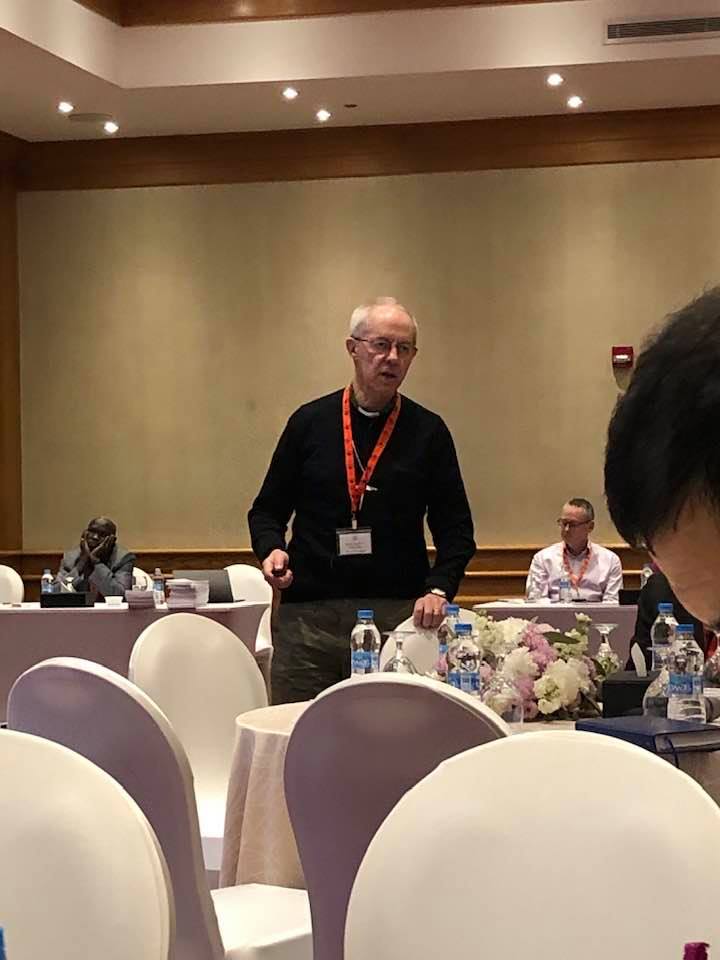Anglicans today are consumed by all thing temporal and few things transcendent. Hence, they are participating in the Season of Creation:
 A CEREMONIAL water-walk along the Great Lake, in Toronto; a river clean-up in Swaziland; and a protest by women religious at a landfill of radioactive material are among the activities that will take place this month to mark the Season of Creation.
A CEREMONIAL water-walk along the Great Lake, in Toronto; a river clean-up in Swaziland; and a protest by women religious at a landfill of radioactive material are among the activities that will take place this month to mark the Season of Creation.
[…..]
In Canada, a coalition of Indigenous and non-Indigenous people will walk along the Great Lake waterfront to promote the better protection of waterways. A bi-weekly vigil and protest is being held at the West Lake Landfill in Bridgeton, Missouri, where radioactive material is stored. It is being led by Sr Jeanne Derer, who said that the the Franciscan Sisters of Mary were “committed to acting in the name of justice and love for Creation”.
The environmental co-ordinator for the Anglican Church of Southern Africa, the Revd Dr Rachel Mash, spoke of a second year of drought. “If rainfall does not improve, the city of Cape Town could run out of municipal water by March,” she said. “Climate change has affected rain patterns, and the worst is yet to come. We have stolen the earth from our children. As Anglicans, healing the earth is a mission priority.”
If “healing the earth” sounds suspiciously like attributing life-like qualities to an inanimate object, it’s because it is. The Anglican eco-justice movement is a disguised form of Gaia worship.
Ironically, James Lovelock, the environmentalist who came up with the Gaia hypothesis has now repudiated it, demonstrating, once again, that the more contemporarily trendy the church attempts to be, the more irrelevant it becomes:
Lovelock is probably best known in environmental circles as the progenitor of Gaia theory – the idea that the planet is a self-regulating, living organism. In 2006, he boosted his green credibility even further with his bestselling book The Revenge of Gaia, whose doomsday narrative predicted that by 2100 climate change would have wiped out 80 percent of the world’s population.
But Lovelock has since renounced this view. Though he still thinks carbon dioxide is a problem because of its warming effects on the climate, he now believes the threat is not immediate.
His change of heart was brought about partly by being in Oslo when the Intergovernmental Panel on Climate Change was awarded the Nobel Peace Prize. He was not impressed by the calibre of the scientists attached to the IPCC – least of all its then-head Rajendra Pachauri “who turned out to be somewhat corrupt.”
“There is global warming. But the stupid bloody academics screwed it up,” he says now – meaning that they got their sums wrong and exaggerated the speed with which the planet is warming.
A bigger worry, he says, are the wrong-headed policies being introduced supposedly to combat “climate change.”
He particularly loathes wind turbines because they are expensive, inefficient and environmentally damaging. The only reason they are being built, he says, is because “there is so much money in renewable energy. I’m sure there’s giant corruption going on.”
The solution, he argues, is nuclear power which has had a terrible press because of green propaganda most likely funded by fossil fuel industries. Nuclear’s health risks have been exaggerated by credulous greens who say “there’s no amount of radiation that can’t give you cancer.”
Like this:
Like Loading...




 A CEREMONIAL water-walk along the Great Lake, in Toronto; a river clean-up in Swaziland; and a protest by women religious at a landfill of radioactive material are among the activities that will take place this month to mark the Season of Creation.
A CEREMONIAL water-walk along the Great Lake, in Toronto; a river clean-up in Swaziland; and a protest by women religious at a landfill of radioactive material are among the activities that will take place this month to mark the Season of Creation.